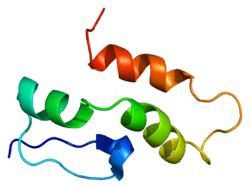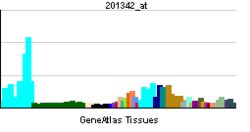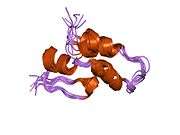Small nuclear ribonucleoprotein polypeptide C
| View/Edit Human | |||
U1 small nuclear ribonucleoprotein C is a protein that in humans is encoded by the SNRPC gene.[2][3][4]
Interactions
Small nuclear ribonucleoprotein polypeptide C has been shown to interact with Ewing sarcoma breakpoint region 1.[5]
References
- ↑ "Human PubMed Reference:".
- ↑ Sillekens PT, Beijer RP, Habets WJ, van Venrooij WJ (October 1988). "Human U1 snRNP-specific C protein: complete cDNA and protein sequence and identification of a multigene family in mammals". Nucleic Acids Res. 16 (17): 8307–8321. doi:10.1093/nar/16.17.8307. PMC 338560
 . PMID 2971157.
. PMID 2971157. - ↑ Gunnewiek JM, van Aarssen Y, Wassenaar R, Legrain P, van Venrooij WJ, Nelissen RL (February 1996). "Homodimerization of the human U1 snRNP-specific protein C". Nucleic Acids Res. 23 (23): 4864–4871. doi:10.1093/nar/23.23.4864. PMC 307476
 . PMID 8532530.
. PMID 8532530. - ↑ "Entrez Gene: SNRPC small nuclear ribonucleoprotein polypeptide C".
- ↑ Knoop, L L; Baker S J (August 2000). "The splicing factor U1C represses EWS/FLI-mediated transactivation". J. Biol. Chem. UNITED STATES. 275 (32): 24865–24871. doi:10.1074/jbc.M001661200. ISSN 0021-9258. PMID 10827180.
Further reading
- Yamamoto K, Miura H, Moroi Y, et al. (1988). "Isolation and characterization of a complementary DNA expressing human U1 small nuclear ribonucleoprotein C polypeptide". J. Immunol. 140 (1): 311–7. PMID 2961811.
- Maruyama K, Sugano S (1994). "Oligo-capping: a simple method to replace the cap structure of eukaryotic mRNAs with oligoribonucleotides". Gene. 138 (1–2): 171–174. doi:10.1016/0378-1119(94)90802-8. PMID 8125298.
- Nelissen RL, Gunnewiek JM, Lambermon MH, Van Venrooij WJ (1997). "Cloning and characterization of two processed pseudogenes and the cDNA for the murine U1 snRNP-specific protein C". Gene. 184 (2): 273–278. doi:10.1016/S0378-1119(96)00612-9. PMID 9031639.
- Suzuki Y, Yoshitomo-Nakagawa K, Maruyama K, et al. (1997). "Construction and characterization of a full length-enriched and a 5'-end-enriched cDNA library". Gene. 200 (1–2): 149–156. doi:10.1016/S0378-1119(97)00411-3. PMID 9373149.
- Dumortier H, Klein Gunnewiek J, Roussel JP, et al. (1999). "At least three linear regions but not the zinc-finger domain of U1C protein are exposed at the surface of the protein in solution and on the human spliceosomal U1 snRNP particle". Nucleic Acids Res. 26 (23): 5486–5491. doi:10.1093/nar/26.23.5486. PMC 147990
 . PMID 9826776.
. PMID 9826776. - Charroux B, Pellizzoni L, Perkinson RA, et al. (2000). "Gemin4. A novel component of the SMN complex that is found in both gems and nucleoli". J. Cell Biol. 148 (6): 1177–1186. doi:10.1083/jcb.148.6.1177. PMC 2174312
 . PMID 10725331.
. PMID 10725331. - Knoop LL, Baker SJ (2000). "The splicing factor U1C represses EWS/FLI-mediated transactivation". J. Biol. Chem. 275 (32): 24865–24871. doi:10.1074/jbc.M001661200. PMID 10827180.
- Pellizzoni L, Baccon J, Rappsilber J, et al. (2002). "Purification of native survival of motor neurons complexes and identification of Gemin6 as a novel component". J. Biol. Chem. 277 (9): 7540–7545. doi:10.1074/jbc.M110141200. PMID 11748230.
- Strausberg RL, Feingold EA, Grouse LH, et al. (2003). "Generation and initial analysis of more than 15,000 full-length human and mouse cDNA sequences". Proc. Natl. Acad. Sci. U.S.A. 99 (26): 16899–16903. doi:10.1073/pnas.242603899. PMC 139241
 . PMID 12477932.
. PMID 12477932. - Förch P, Puig O, Martínez C, et al. (2004). "The splicing regulator TIA-1 interacts with U1-C to promote U1 snRNP recruitment to 5' splice sites". EMBO J. 21 (24): 6882–6892. doi:10.1093/emboj/cdf668. PMC 139089
 . PMID 12486009.
. PMID 12486009. - Rush J, Moritz A, Lee KA, et al. (2005). "Immunoaffinity profiling of tyrosine phosphorylation in cancer cells". Nat. Biotechnol. 23 (1): 94–101. doi:10.1038/nbt1046. PMID 15592455.
- Andersen JS, Lam YW, Leung AK, et al. (2005). "Nucleolar proteome dynamics". Nature. 433 (7021): 77–83. doi:10.1038/nature03207. PMID 15635413.
This article is issued from Wikipedia - version of the 6/5/2016. The text is available under the Creative Commons Attribution/Share Alike but additional terms may apply for the media files.


